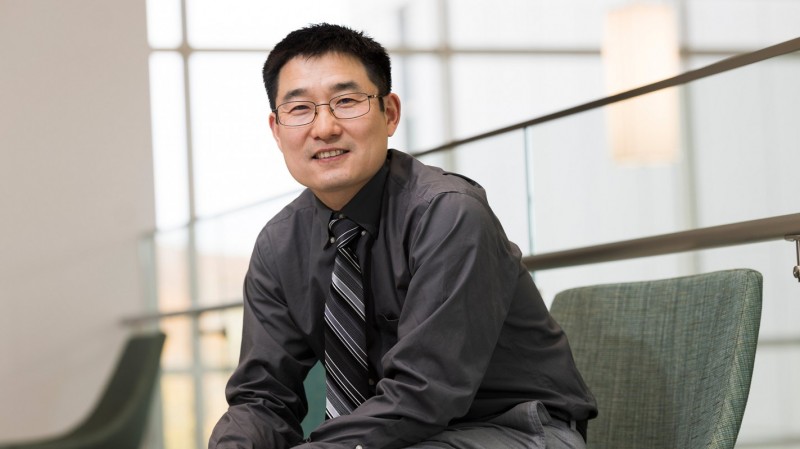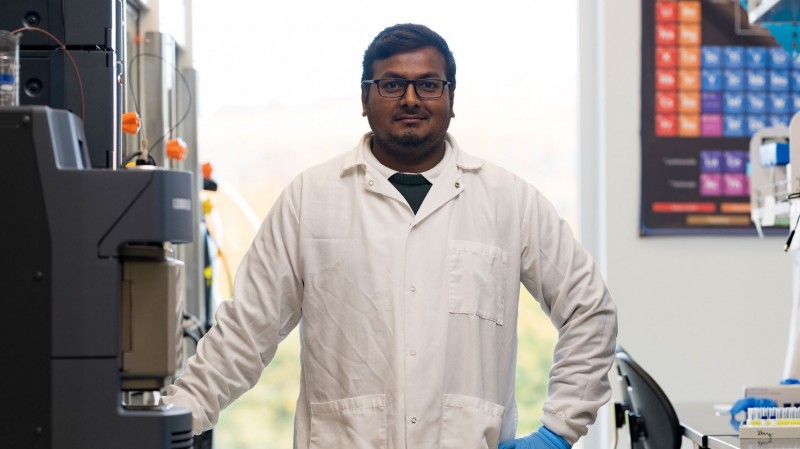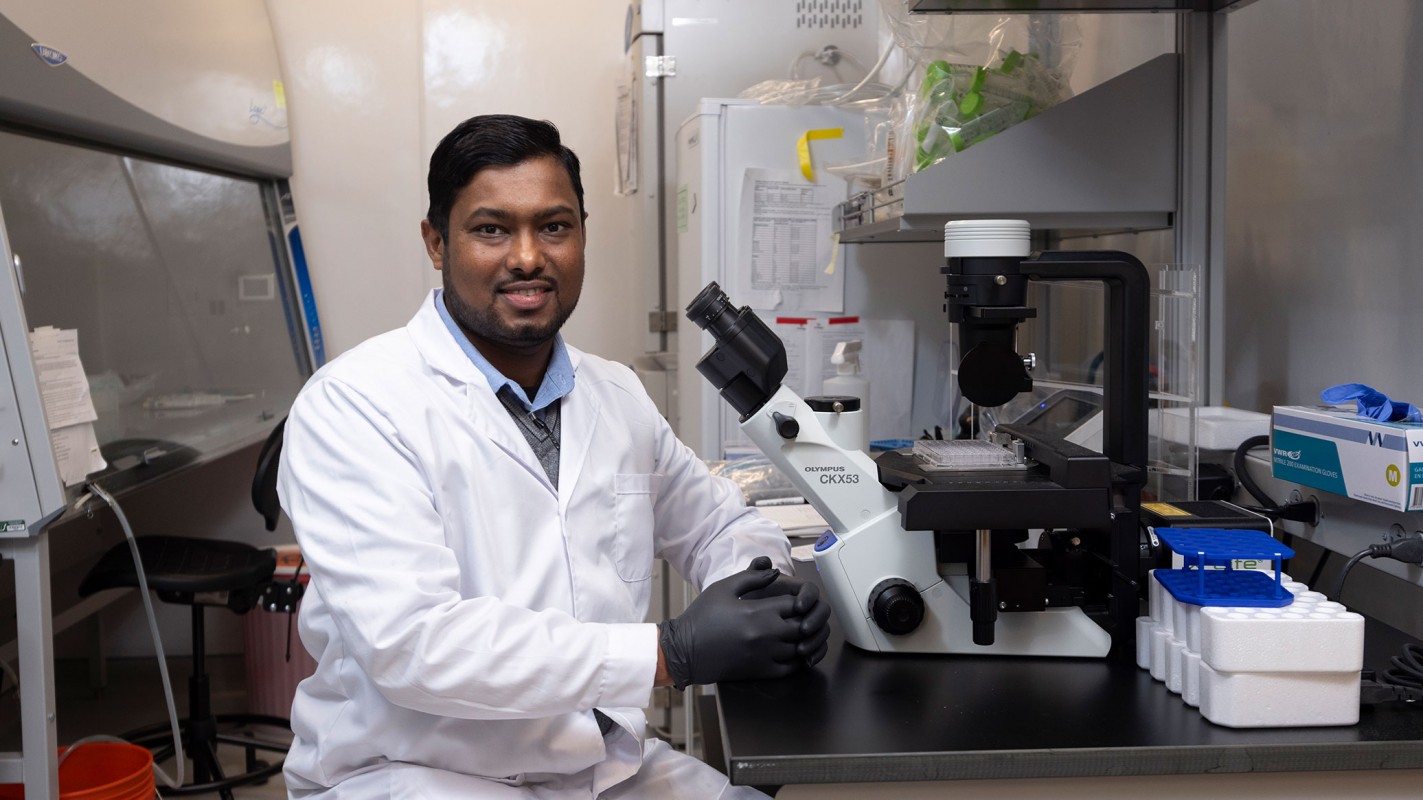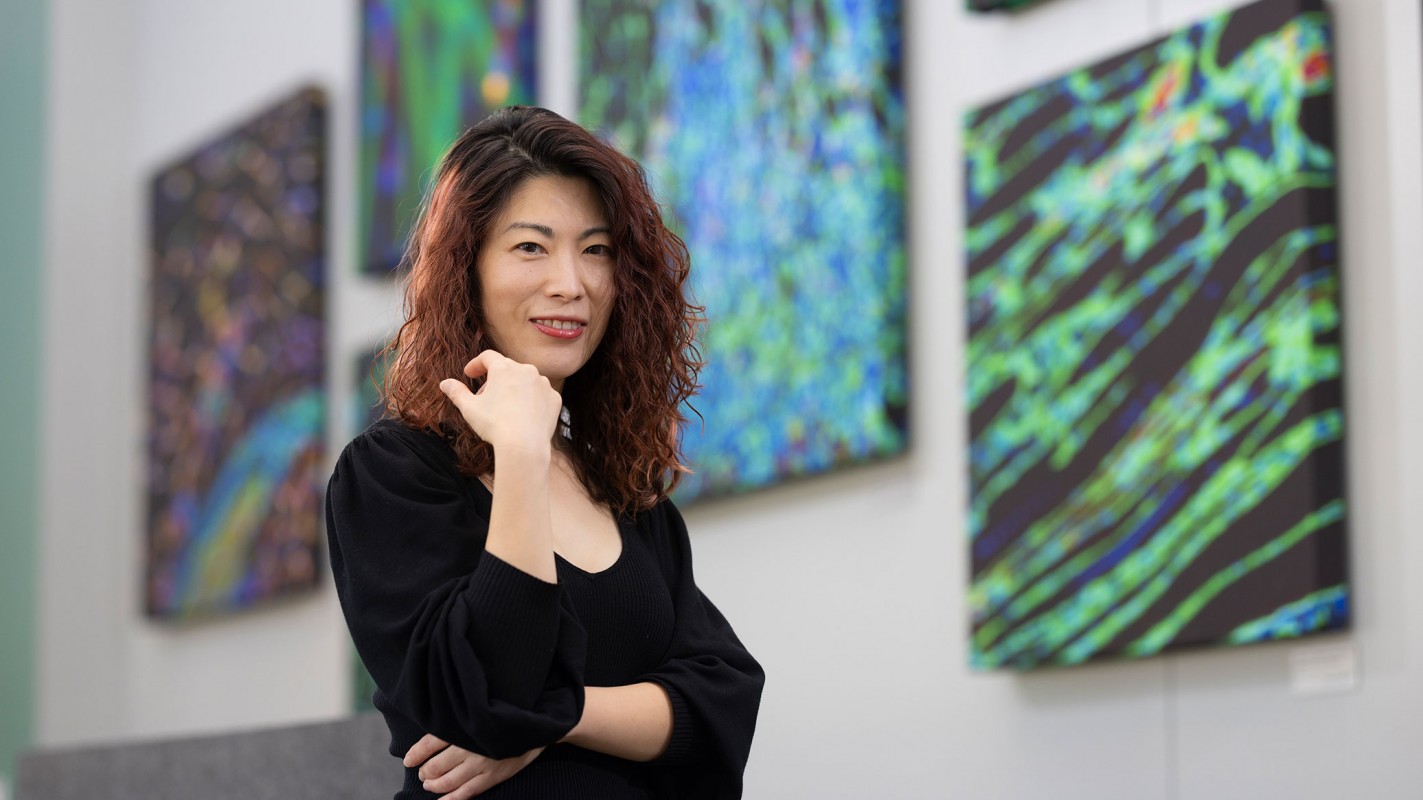If you break down the human elements of research, you find both wonder and uncertainty. Like chemical bonds, these elements relate to each other in complex ways: the wonderment that leads to new questions, an openness to complex answers that yield even more questions.
The uncertainty is a given. You never quite know where research will take you, after all: from fish and fruit flies to the human brain - and to labs all over the world.
Postdoctoral fellows - or postdocs - are a key component of research at the School of Pharmacy and Pharmaceutical Sciences, and around the globe. These positions allow early-career scientists to further their professional development and make the transition from successful graduate student to independent researcher. In addition, they often take additional leadership or teaching responsibilities in labs and departments.

It's a liminal place: postdocs aren't students, but they aren't faculty members, either. And while they have goals and dreams, their professional futures are still taking shape. Associate Professor of Pharmaceutical Sciences Tao Zhang, also director of the Pharmacokinetics and Bioanalysis Facility, has two postdocs in his lab: Sung Hun Bae and Mohammad Asikur Rahman; the latter is co-sponsored by both Zhang and Associate Professor Nathan Tumey. Both postdocs work on projects building innovative assays and pharmacokinetic models of drug secretion into breast milk, with the goal of assessing drug safety for breastfeeding mothers and infants.
"Postdocs are crucial to my research," Zhang says. "They bring substantial experience and independence, which allows them to contribute significantly to advancing projects and managing complex experiments."
Drawing on knowledge
Fellowships aren't necessary to work in industry, but they play a major role in shaping academic careers, preparing scientists to someday run their own university labs, explains Mohan Mullapudi, a medicinal chemist and one of three postdocs in Tumey's lab. Many aspiring academics complete at least three years of postdoctoral research, which they select based on their professional development needs.

Mullapudi is from India's temple city of Tirupati and received his master's degree from the National Institute of Pharmaceutical Education and Research Raebareli and a PhD from the Indian Institute of Science Education and Research Pune, two of India's most prestigious institutes. After finishing his doctorate, Mullapudi pursued postdoctoral positions in his field, but the coronavirus pandemic put his plans on hold. Instead, he ended up at an Indian startup. When the pandemic subsided, he found LAILA GEDEON '24 a position in Binghamton.
In Tumey's lab, Mullapudi researches immunestimulating antibody conjugates (ISACs), which are used in cancer immunotherapy. With these agents, the body's immune system is prompted to attack the cancer, providing oncologists with another tool to treat a complex and often terrifying disease.
Side effects of immune-stimulating drugs, however, can be challenging - and familiar to anyone who has suffered from a severe viral illness: fevers and body aches, for example. A long-term goal in drug development is to direct the immune activation only at the site of the cancer rather than a whole-body response.
Mullapudi is researching an approach that can mitigate this program. If the drugs are conjugated to specific antibodies, creating ISACs, immune stimulation only happens in the tumor's microenvironment, potentially reducing adverse side effects, he says. Mullapudi is particularly focused on pancreatic cancer, which has no established, effective treatments, making it one of the deadliest forms of the disease.
A postdoc in Assistant Professor Yanyan Li's lab, Thilina Kasthuriarachchi had his start in zoology, focusing on aquaculture in his native Sri Lanka. He then worked as a high school biology teacher before earning his master's degree in industrial and environmental chemistry. After a stint in environmental monitoring at Sri Lanka's National Aquatic Resources Research and Development Agency, he headed to Jeju National University in South Korea to earn a master's and PhD in marine molecular biology.

His work now focuses on inflammatory bowel disease (IBD). For one project, he monitors how different pharmaceuticals impact an inflamed gut using mouse models. In another, the lab investigates the connection between gut microbiota and IBD; a third explores how that gut microbiota affects the brain via the gut-brain axis.
"The gut-brain axis is a recent discovery associated with brain health," he explains. "Researchers found that when we have a healthy gut microbiome, we have better mental health."
He'll also be setting up Drosophila model systems to study the gut-brain axis in neurodegeneration, complementing the current mouse models. With such varied research streams, Kasthuriarachchi's diverse scientific background has proven an asset.
"When we have a lot of exposure, we can go in any direction," he says.
Mastering new skills
Landing a postdoc can be challenging in many ways; many of these researchers find themselves far from their homeland, a situation that can last for years or even a lifetime. Others, such as Kasthuriarachchi, balance family life - his wife is a postdoc in Binghamton's Chemistry Department, and the two have an 8-year-old son.
If you're seeking financial solvency, look for a job in the private sector after earning your graduate degree, Mullapudi advises.
"A postdoctoral experience can often be daunting. You have to be prepared to take these calculated risks," he says. "If you do want to pursue postdoctoral research, do so in a different country or institute, so you get exposed to different research environments."
Sometimes a postdoc needs to add new skills, so instead of teaching, Mullapudi audited an immunology course in Binghamton, he says.
Postdoctoral fellows have more freedom to generate new ideas and experiments than doctoral candidates, who typically follow the path laid by their mentor's lab. Like Kasthuriarachchi and his pivot from marine to human biology, they can shift their focus to master new techniques and explore new areas.
A molecular biologist by training, Kasthuriarachchi has been developing skills related to chemistry that are useful in drug development research. Right now, Mullapudi is focused on developing two skill areas: antibody engineering and grant writing. Ultimately, he plans to return to India, where he will work in academia and continue to research infectious diseases and cancer immunotherapy.
Kasthuriarachchi would also like to become a principal investigator, running a lab in collaboration with other researchers. Long-term, he would like to explore the link between inflammatory and viral diseases, he says.
"A key goal in a postdoc is threefold: first to diversify your skill set to make you more 'marketable' during your job search; second to use your current expertise to rapidly advance a project in order to produce publications; and third to build scientific independence," Tumey says.
For their part, mentors are tasked with supervising projects, providing the guidance necessary to keep the work moving forward and assisting with troubleshooting when experiments encounter challenges. They also foster their mentees' professional and research development.

Neither Li, Tumey nor Zhang were postdocs themselves; Zhang and Tumey had a prior career in the pharmaceutical industry, and Li secured a faculty position early on. However, both have collaborated with postdocs during their career, and Li remembers well the challenges of being an early-career scientist, she says.
Li joined Binghamton in January 2024 and began building her lab from scratch. Hired in April, Kasthuriarachchi was her first postdoc and played an important role in getting the lab up and running, she says.
Both Kasthuriarachchi and Mullapudi are grateful for the support of their Binghamton mentors, as well as family and previous mentors. Like so much in research, mentoring is a collaborative process.
"We have different areas of expertise and learning from each other is very beneficial. And besides that, I like to share my thoughts and experience in what it's like to be a PI and a faculty member," Li reflects. "[Postdocs] bring in a wealth of prior research experience and technical expertise, which significantly contributes to the current projects."










